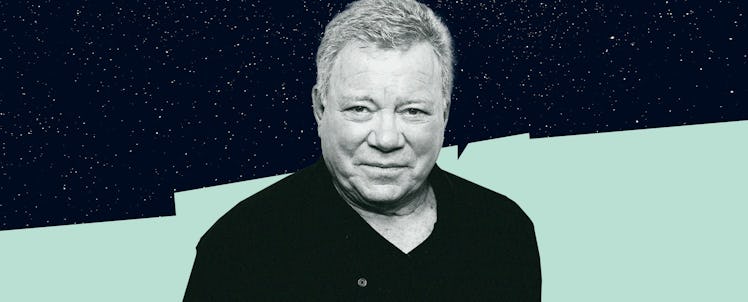William Shatner Knows How Parents Can Save the Planet
"Tell your kids...that it's like the Earth has a fever."

William Shatner is grounded. After returning from his Blue Origin’s New Shepard flight, the famously verbose actor, producer, and writer is seemingly more philosophical, but also, well, more down-to-Earth, than ever before. In a Zoom call to discuss the new Amazon Video documentary Shatner in Space, William Shatner says, the health of the planet is “like a child who has gotten a temperature. The planet has a cold.”
Shatner didn’t say this unprompted. Because he’s a father and a grandfather — he has adult three daughters — I wanted to know if Captain Kirk himself, now the oldest person who has ever flown in space, has any meaningful advice to families about the future of our planet. Upon returning to Earth following his 11-minutes aboard Blue Origin’s New Shepard-18, Shatner said “Everybody in the world needs to do this.” Shatner’s belief is that the “perspective” of seeing the Earth from space could have a transformative impact on how all human beings see the fragility of our planet. Unsurprisingly, this is the kind of thinking that launched Shatner’s acting career. In Star Trek’s future history, the reason why human beings have united is that after meeting aliens and seeing the Earth from another perspective, those notions grounded humanity, and eventually, brought peace on Earth.
But what’s the practical thing we can tell our kids now? Shatner thinks that if you’re talking to a preschooler or kindergartner about climate change and the need to protect the Earth for future generations, the message is simple:
“The health of the planet is so precarious. It’s like the Earth as a fever,” Shatner says.
“A cold can be overcome after a few days in bed. But the planet takes so much longer to recover from an illness. And the illness is coming from us and we have to not hurt our precious earth. This tree growing in your backyard, this plant, this, this too, this too can be affected by you, my child.”
William Shatner’s reputation is famously filled with all sorts of contradictions. His Star Trek co-stars have said various negative things about him over the years, which he’s countered. The bickering has volleyed back and forth for long enough it’s hard to know what to think. But, regardless of what side you take, know this: If you ask William Shatner a direct question like “what can I tell my kids about how to save the Earth?” he will launch into that answer with full-tilt Shatner verve, without a shred of irony.
When it comes to the messaging about the link between having a global perspective and saving the environment, William Shatner understands the assignment. He’s been a contributor to Greenpeace since 1986’s Star Trek IV: The Voyage Home, a blockbuster film that increased awareness about whale-hunting and increased donations to Greenpeace in specific. And now, in talking about his Blue Origin flight, you can tell that although Shatner is appreciative of Jeff Bezos giving him a chance to boldly go where no 90-year-old has gone before, his focus is much bigger than a cool ride with Blue Origin. Shatner has been thinking about all of this for a long time.
“I read Rachel Carson’s book The Silent Spring, fifty-something years ago,” Shatner says.
“I read that book and I, I was imbued with the spirit of the book.
And then I became friends with the ecologist Michael Tobias and we did a series of films [in 1991] called Voice of our Planet.“
Shatner thinks, that much like in the future history of Star Trek, getting more people into space not only helps shift the perspective on the planet but also can move “harmful industry” out of the Earth and prevent pollution. He’s not saying we should start littering outer space either. But, because “we’ve passed the tipping point on Earth,” Shatner thinks that at least part of the green energy solution could be connected to space travel.
If the philosophical value of space travel needed its Ted Lasso, William Shatner is the perfect candidate. For countless millions, Shatner is the OG space dad, the guy who, as Captain Kirk battled his dad bod as much as he battled Klingons and the occasional lizard man. So, in speaking to Shatner, face-to-face, you feel like you’re talking to the archetypal Boomer dad, the kind of guy many of our dads would have aspired to be, “I’m not a wise old man,” Shatner says and I wonder if he’s focused on the “wise” part or the “old part.” But, he’s right. Shatner doesn’t seem old, and he’s not trying to be wise. He simply seems genuinely concerned and invested in promoting positive messages about environmentalism and green energy. If you look at the rest of his career, he’s always been like this. “I’ve lived the beauty of the Earth and its slow decay.”
It’s a powerful sentiment, particularly because it seems likely that Shatner will not be around to see how some of this stuff works out with our climate crisis. But then again, maybe he will?
In the classic 1968 episode “Return to Tomorrow,” Captain Kirk encouraged his shipmates to assist formless aliens with the construction of immortal android bodies. Seeing William Shatner fly into space for real made me wonder if he had slipped into one of those robot bodies in real life. After I spoke to him over Zoom, I was sure of it. William Shatner will live forever.
And, if we listen to even an iota of his advice, maybe our planet will, too.